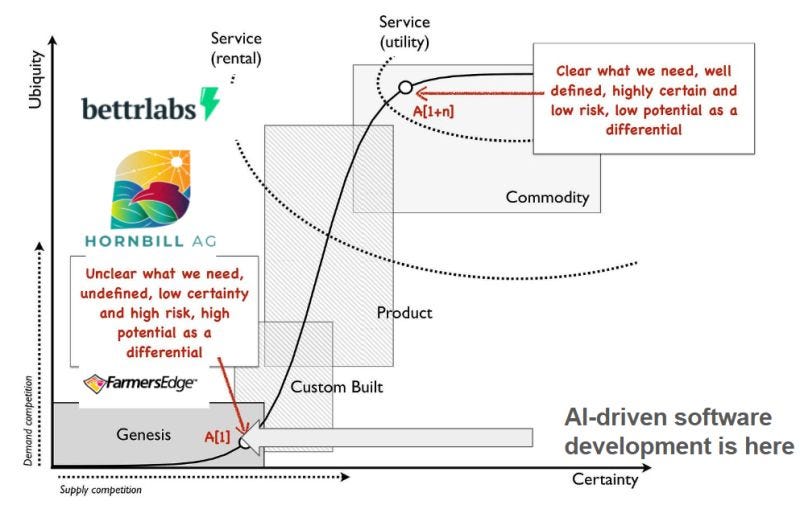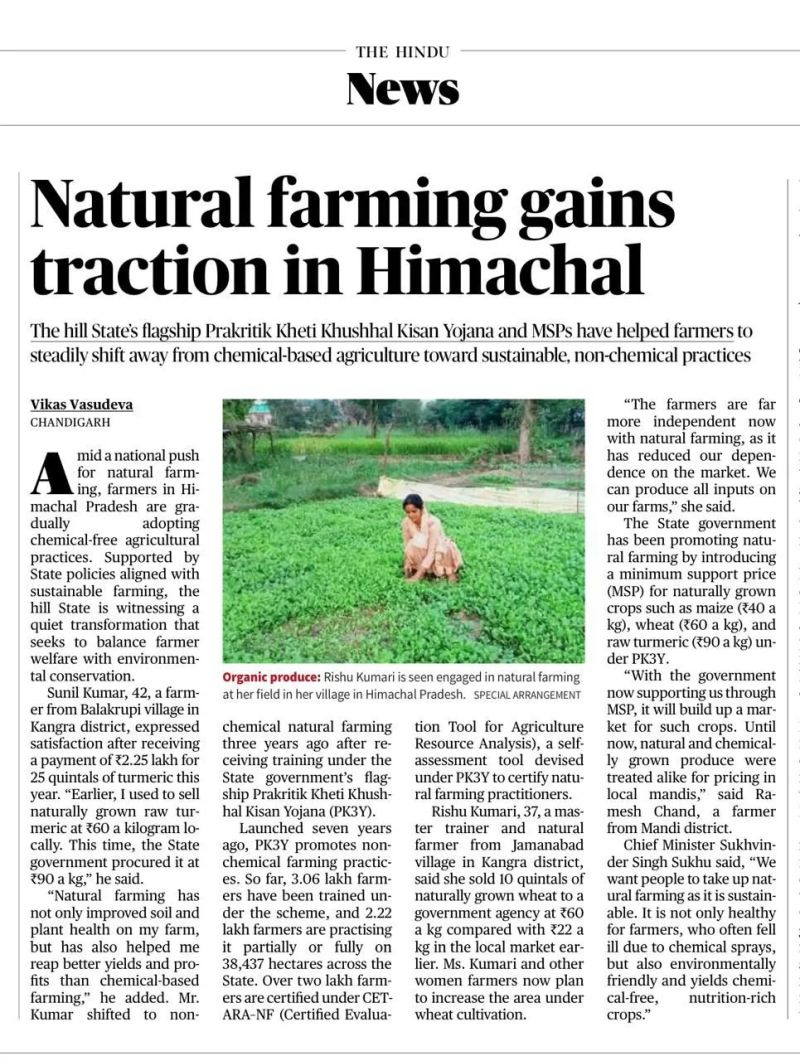Sunday Reflections (AI, Venture Studio, Loss Aversion)

Dear Friends,
Greetings from Hyderabad, India. Welcome to Sunday Reflections where I reflect on what I’ve written and ask myself, In doing what I am doing, what am I really doing?
Subscriber-Only Post Plugins
Artisanal AI-Agritech Software Plays ($)
It’s fascinating how AI wave is suddenly bringing a new wave of services-driven agritech players with solid technological chops. Thanks to AI, we are now redesigning what tech layer can do - what a computer ought to do- and going by what’s happening around, it seems like a great time to build AI-driven agritech services companies.
Pay attention to the commonality underpinning these newer ventures (Bettrlabs, Hornbill Agritech) that have started over the last six-eight months
As an agritech analyst, the question that interests me is this. Why are the founders interested in building a tech services company in the age of AI?
At a time when OpenAI is working its way to be the windows of AI, many agritech companies are seeking higher margins at Genesis stages (see the image above) where bespoke software could be built. We are in a period of great uncertainty and Genesis stage companies can create greater value by clearing the fog of uncertainty.
More insights (including an upgraded agritech value stack) in a recent subscriber-only edition of Agribusiness Matters.
MSP (Minimum Support Price) for Organic Crops in India: What can go wrong?
There is a lot of narrative propaganda going around the role of MSP and how they help farmers transition towards natural/organic/non-chemical farming practices in India.
Sample this piece.
What really happens in the ground? Sample this anecdote from an agripreneur in Madhya Pradesh during a conversation in the agripreneur community.
“Currently, MSP procurement for summer moong is on in MP.
What’s happening?
The Nexus is at play...harvested crop has lot of split Grains, mud particles and other impurities...the procurement team takes heavy commission to accept poor quality and mixes it...govt ends up paying full for the stock which is really poor quality. Who is actually paying here???
What’s the % of such procurement...30 - 40%”.
The problem lies in the procurement mechanism and no MSP scheme can fix that.
And to top that, MSP is riddled with further problems.
-India has already breached WTO limits on trade-distorting agricultural support, with procurement at prices higher than market prices counted as subsidized support.
Expanding MSPs to organic crops would worsen this violation.
-MSP kills crop diversity, increases land rent and has tons of additional side effects. MRP does a much better job.
- If MSP is bad, legally guaranteeing MSP is much worse.
More in a recent subscriber-only edition of Agribusiness Matters.
P.S. Ashish Gupta who works with Himachal Pradesh Government penned a thoughtful response, challenging my narrative propaganda argument:
“MSP is not the solution that much is clear to all (most?). It is a process to get to a solution. The tool itself was actually instated in 1960s to promote Green Revolution seeded crops and encourage farmers to grow more. It has stuck around since - partly for political reasons and partly because the other side of Price Discovery is collusion laced.
Farmers understand this well. Entrepreneurs who are bringing such transformation based on Agroecology also understand that MSP is also a possible tool for price discovery input as a floor price mechanism. What MSP is missing is the Ecological aspect. This is also covered in the Innovators Handbook for Sustainable food systems. (FAO and INRAE. 2020. Enabling sustainable food systems: Innovators’ handbook. Rome. https://doi.org/10.4060/ca9917en)
HP appears to be the only state undertaking such transformation. This aspect - at the very least - is to be celebrated and learnt from.
Those who actually grow and sell - understand this! Rest may need to actually become practitioners to devise innovations. One such innovation in HP - presently is the ‘MoolySHIKHAR’- True Price Discovery mechanism - being designed for Ubiquitous application!”
Why did Jiva Shut Down?
Few moons ago, I was sad to learn about Jiva’s shutdown. It was evident that Olam’s $2.58B asset sale to reduce debt took priority. In its H1 2025 results, Olam Group reported a loss of S$13.2 million related to the impairment of intangible assets within the Incubating Businesses segment, primarily associated with Jiva Ag.
Jiva struggled to achieve sustainable profitability at scale across its four-pronged business model. The platform offered microfinancing, agricultural e-commerce, AI-powered advisory services, and harvest purchasing.
In Indian agritech context, Dvara Holdings group is an interesting venture studio model that has largely thrived despite lesser incentives for founders to take big risks within their structure.
More in a recent subscriber-only edition of Agribusiness Matters.
Post-Script: Dvara Holdings CEO Samir Shah responded to my comments about Dvara Holdings.
“Our model with Founders is a combination of a reasonable amount of stock and equally important some fixed cash. Our EIRs are usually first time entrepreneurs and hence dont have enough financial cushion to not draw salary, but that doesnt make them any less passionate and committed to what they are building. And we keep increasing their stock as the start-ups grow, so at time of eventual liquidity, they should have sufficient stock to ensure they create reasonable capital from what they have built. Dvara Holdings also provides shared services to our startups so that our Founders can focus on problems they are solving while at the same the companies get world class governance, compliance and management accounting capability. So, every model is different and built in support of what it is trying to achieve. At Dvara we are trying to solve white space problems. Thank you for your support.”
What happens to Big 6 when Corteva breaks up into two (Seeds and Crop Protection businesses)
In my earlier demarcation of Big 6 agritech strategies, I had categorized Corteva under product-driven digital gameplays (as opposed to outward-customer-driven ecosystem), evident when you observe that they are “firing in all cylinders”, in their CEO’s words, to ensure that their investors get ‘the highest return on R&D’.
As reported by Wall Street, spinoff between CP and Seeds is now inevitable in today’s agribusiness climate as it can ensure that more risk-capital move towards Seeds segment which is getting further bundled with Biologicals and seed treatment options.
More in a recent subscriber-only edition of Agribusiness Matters.
PM-Pranam Scheme and Loss-Aversion
PM-Pranam Scheme (which aims to redirect saved fertilizer subsidy towards natural farming) is stuck in a classic case of loss aversion.
Government of India shared a lot of data around this. The focus is so caught up on fertilizer subsidy reduction that there is little thought on strengthening alternative (to the point of almost giving up hope on alternatives).
Few days ago, Andhra Pradesh govt announced 800 INR as an incentive for every bag of urea farmer stops using.
The PM-PRANAM scheme, designed to reduce chemical fertilizer use, showed modest initial results in 2023-24, saving ₹3,157 crore in subsidies by cutting fertilizer consumption by 15.14 lakh tonnes. Karnataka was the top-performing state.
However, this saving is minor compared to the total annual fertilizer subsidy (over ₹1.8 lakh crore) and the scheme’s ₹20,000 crore target.
That said, there is a lot for the scheme to improve.
->> Short Duration: The scheme’s three-year term is too brief and should be extended.
->> Misallocated Grants: Saved funds are diverted to unrelated projects instead of being fully reinvested in natural farming.
->-> Lack of Local Focus: A state-level approach ignores district efforts; a district-focused model would be more effective.
->->Neglect of Traditional Farming: The scheme fails to protect and incentivize existing organic farming regions.
“Under PM-PRANAM, 14 states have shown a reduction of 15.14 LMT in consumption of chemical fertilizers during FY 2023-24 as compared to the average consumption of previous 3 financial years. However, Rajasthan has not achieved any reduction on consumption of chemical fertilizers.”
In the case of Andhra Pradesh, thanks to the branding and marketing around APCNF(Andhra Pradesh Community Managed Natural Farming), I was hoping to see reduction in fertilizer subsidy. I don’t see it reflected in the data.
I hope APCNF isn’t stuck in narrativization games.
Should India Feel Inferior to Its Netherlands Counterpart?
A friend wrote a fascinating comment in response to my article in a forum we are a part of.
“We want to ape their progress but don’t want their model. They are very business oriented and that is one reason of their success and funds. How many in this group would agree to private Agriculture companies tie up with Indian public agricultural research - the criticism and issues would not end. The Indian agri public research has no money & even if the public funding was available, tie up with private sector would be required for transformative change. It’s more like, we need to introspect on how to progress and to make drastic course revision to quickly meet objectives. Like it or not, compromises will have to made or many more generations on the farm will be wasted away. All compromises are imperfect.”
I received another fascinating comment that placed PUSA in its locational context.
“ICAR was in Pusa a rural areas.The shift to Delhi was itself unfortunate. Pantnagar University is in rural area. The lament is sound . Our agri graduates are working in cities looking after urea availability . The extension Dept.staff is mostly urban based . We are not utilising our bovine wealh for agricultural purposes to improve soil humus and agri -production”
Indian Agritech, AI and DPI
Indian Agritech has been going through the phase that is best epitomized in this famous quote by Warren Buffet: Only when the tide goes out do you discover who’s been swimming naked.
In such a scenario, I am always happy to highlight the incredible potential of Indian Agritech. Sidhatri Gauba reached out with some interesting questions and got an opportunity to talk about Indian Agriculture, Agritech and AI.
I also had the opportunity to talk with folks at Focus Agritech few moons ago and talked about my Impact thesis.
Upcoming Event: Food Systems Dialogue Hosted By Climate Party
🥘Open dialogue on food systems x climate change: The intricate connection between food, our health, agriculture, and climate change is often overlooked, yet it fundamentally shapes our survival. Our experts will help you grasp key concepts that will undoubtedly challenge and expand your current perspectives on soil, food & health. Listen & ask questions to Shashi Kumar | Founder, Akshayakalpa Organic - a leading organic farming & dairy brand. Venky Ramachandran | Founder, Agribusiness Matters - research firm & publication on everything agriculture.
You can RSVP here
How happy are you with today’s edition?
I would love to get your candid feedback. Your feedback will be anonymous. Two questions. 1 Minute. Thanks.🙏
💗 If you like “Agribusiness Matters”, please click on Like at the bottom and share it with your friend.







